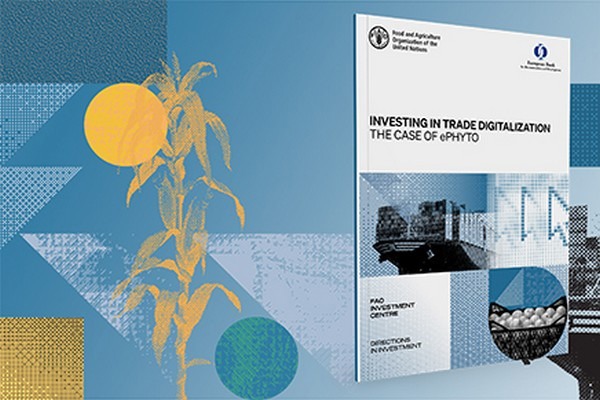The use of electronic phytosanitary certificates—ePhytos—for exporting plants and plant products results in lower trade costs and higher margins for exporters, faster delivery of fresh fruits and vegetables, and ultimately increased agrifood trade.
These findings are highlighted in "Investing in Trade Digitalization: The Case of ePhyto," a new report by the European Bank for Reconstruction and Development (EBRD) and the Food and Agriculture Organization of the United Nations (FAO).
The report, released today at the 19th meeting of the Commission on Phytosanitary Measures (CPM-19), the standard-setting body promoting cooperation among the 185 parties to the International Plant Protection Convention (IPPC), examines how digitalization can facilitate smoother cross-border trade.
All plant and plant products require phytosanitary certification—either paper or digital—for export in line with international phytosanitary standards. Supported by the IPPC, the use of ePhytos has increased in recent years, driven in part by the COVID-19 pandemic. In 2023, the estimated value of all plants and plant product exports from countries using ePhytos was approximately USD 90 billion.
Though many countries still rely on paper phytosanitary certificates, there are significant drawbacks. Paper certificates are not easily corrected when last-minute changes are needed and can be lost, causing long delays at borders, resulting in storage and energy costs, penalties, and jeopardizing the quality of sometimes highly perishable goods.
Based on trade data analysis and interviews with commercial exporters, government officials, and logistics providers in four countries—Serbia, Egypt, Ukraine, and Uzbekistan—the report shows that ePhytos are easier and cheaper to use, more responsive to changing circumstances, and can speed up the export process.
For exporting companies, potential savings range from USD 3.7 per fruit shipment exported from Uzbekistan (or about USD 0.18 per ton based on the average volume of shipments) to USD 83.5 per fruit shipment exported from Egypt (or about USD 4.24 per ton).

These savings become substantial when multiplied over hundreds of shipments per year per export company, or thousands per country. For example, in Egypt, a typical fruit exporting company could save from USD 80,000 to USD 200,000 annually, depending on which of its trade partners also adopt ePhytos. For companies with large export volumes and small margins, this significantly reduces operational costs, contributing to higher margins.
Countries that have already switched from paper to ePhyto confirm that the transition is relatively inexpensive. Integrating ePhyto with other digital trade systems—such as customs declarations, certificates of origin, and quality and safety certificates—could help unlock additional savings and trade opportunities.
The report shows that as more countries adopt ePhyto, the more exporting companies will save. By investing in digital tools like ePhyto, countries can position themselves to reap the full benefits of a more efficient, transparent, and sustainable global trading system. The report provides further recommendations and actions that different public and private stakeholders can take to maximize the benefits of ePhyto.
Source: Food and Agriculture Organization of the United Nations

